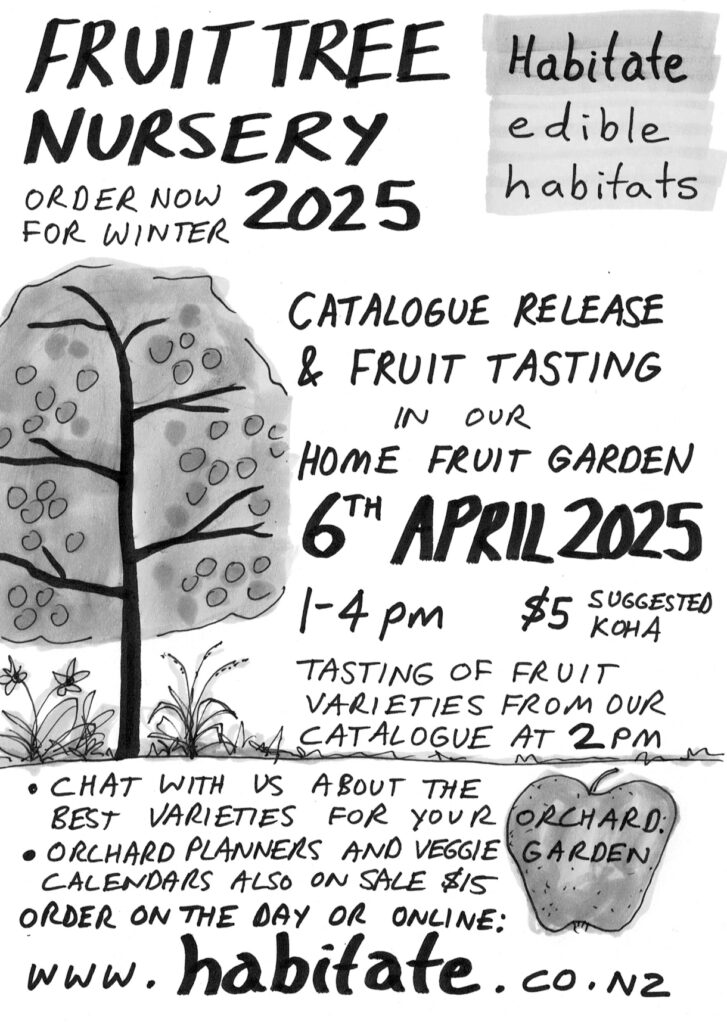
It will be great to see you there! Our garden is full of interesting things this year, come and have a look and a yarn!
Friday, March 14th, 2025

It will be great to see you there! Our garden is full of interesting things this year, come and have a look and a yarn!
Sunday, March 3rd, 2024
Each year we really look forward to our Nursery fruit tasting day where we invite you to try a great range of in season fruit from our nursery.
We often have 20-30 varieties of fruit on display, not all of them will be ripe for tasting but you will get a good idea from this of what you might like to plant in your backyard!
Location: 6 Mclachlan st, Waitati.
This is our home garden where we grow a large proportion of our own food using permaculture principles to integrate chickens, a poly tunnel, worm farming etc
$5 entry per person
Our vegetable growing calendar and orchard planner publications will be for sale at the tasting sessions these are $15 each. Cash on the day please.
Be quick to get a 2024 Habitate Nursery order form and discuss your order with us after the tasting session, early orders are coming in and some plants are selling out already.
Or go directly to our online order form to order today:
https://www.habitate.co.nz/heritage-fruits-nursery/
Children welcome if supervised
No Dogs.
Outdoor event, please dress warmly.
Bring your own travel cup for herb tea.
Email any questions to jason@habitate.co.nz
I look forward to seeing you there!
Regards Jason
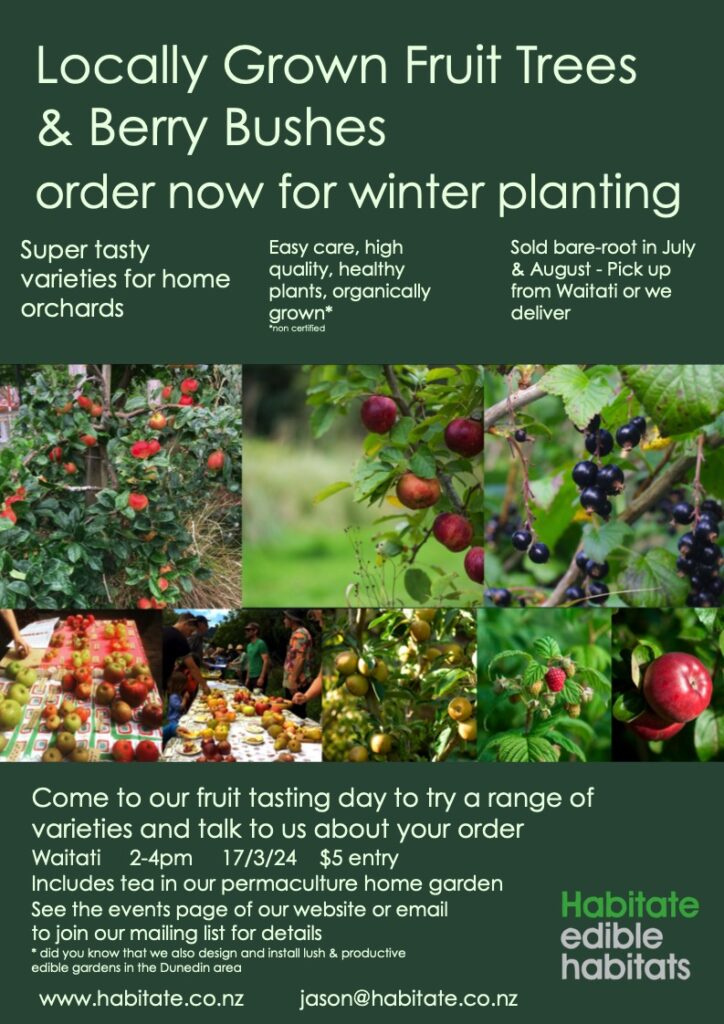
Wednesday, March 4th, 2020
I look forward to seeing you at one or all of our events: Nursery & home garden tour, fruit tasting, nursery catalogue & orchard planner release. No-dig vegetable growing & orchard planning workshops
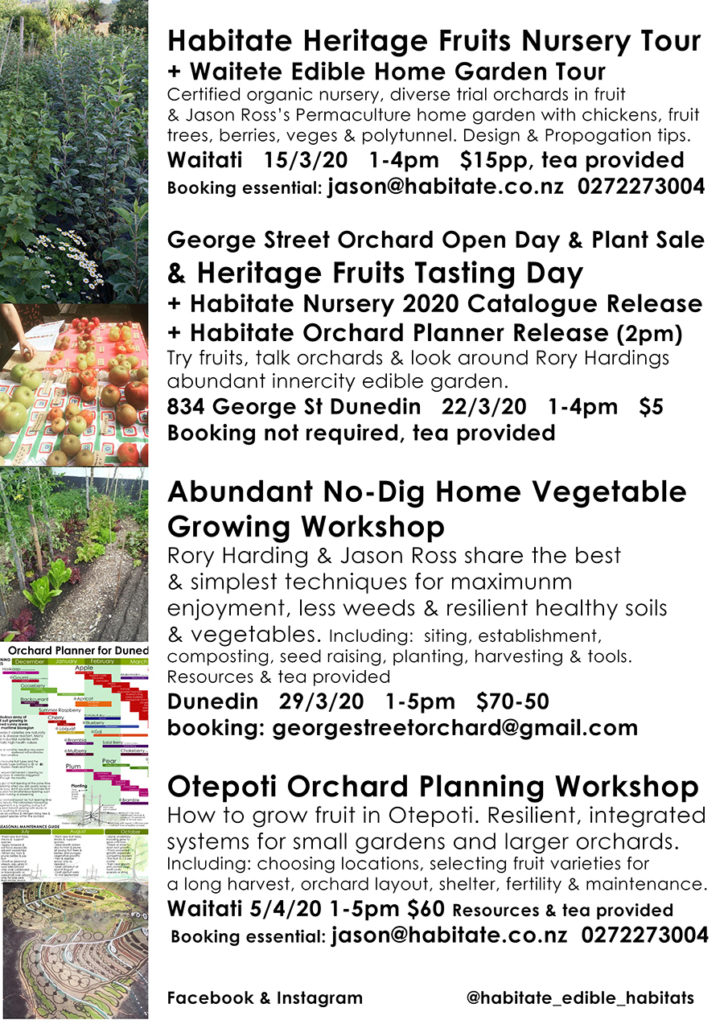
Wednesday, May 1st, 2019
Kia ora!
Tour of our Certified Organic Heritage Fruits Nursery & our Quarter Acre Home Garden: Sunday 5th May 10:30am – Noon $5
See how we grow our plants, see our trail orchards and diverse home vegetable and fruit garden with integrated chickens, perennial vegetables and grassland perennials.
Get inspired, ask questions, enjoy fruit tasting and a cup of tea. Limited spaces, booking required: Email jason@habitate.co.nz
Another way to catch up with us is at The 2019 Harvest Celebration at the Otago Farmers Market on the 11th May. We will be there with apples to try, our catalogues and publications.
We still have a fantastic selection of apples on three rootstocks, Beurre Hardy Pears, berries and comfrey for sale this winter. Some of you were also looking for Monty’s Surprise apple trees, I’m letting you know first, we have them available this winter. We also have Seedling Hazelnut Trees for sale, great for nuts/shelter/coppice.
Follow us & see what we are up to on Instagram or Facebook (same content as our Instagram).
See you soon! Jason
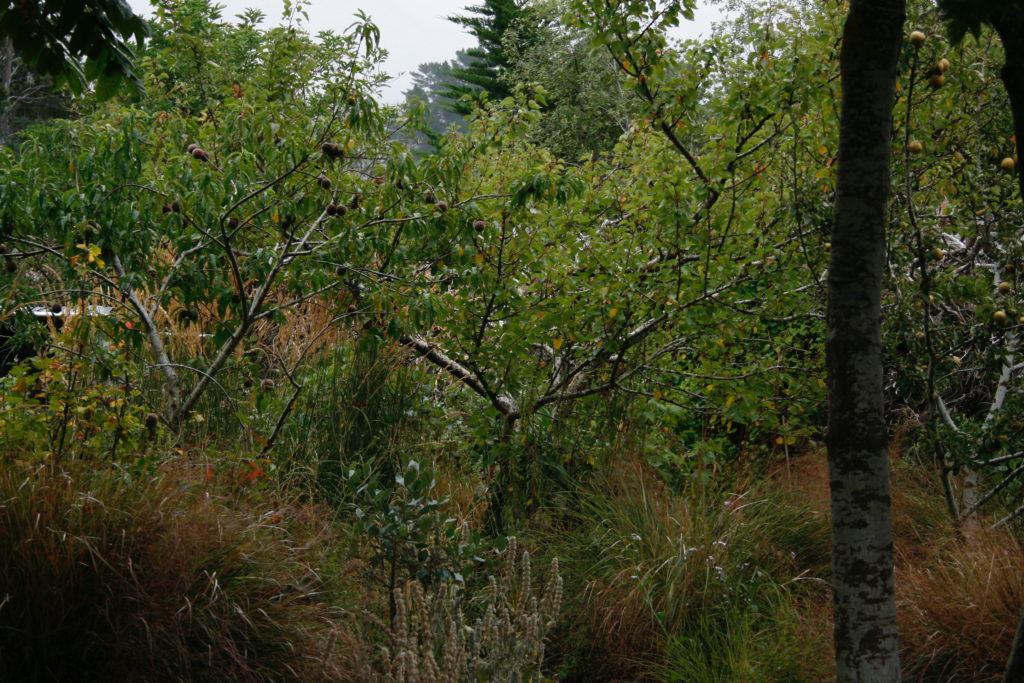
Thursday, March 14th, 2019
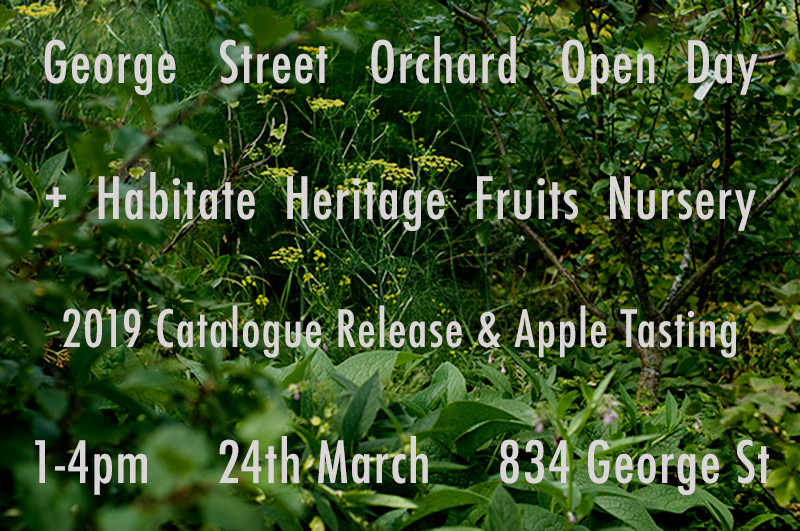 This year we stoked to be releasing our 2019 Fruits Nursery Catalogue and holding our Apple Tasting at the Open Day of George Street Orchard, Rory’s abundant & diverse innercity fruit garden.
This year we stoked to be releasing our 2019 Fruits Nursery Catalogue and holding our Apple Tasting at the Open Day of George Street Orchard, Rory’s abundant & diverse innercity fruit garden.
Taste a huge selection of delicious apples and chat with us about the best fruit trees and berries to plant in your garden this winter.
This is a great chance to look around George Street Orchard and see how fruit trees, bushes and vines can be creatively fitted into a very small innercity section.
Rory will also have a great range of potted plants for sale on the day:
Grapes, Figs, Aronia berries, Goumi berries, Monkey puzzle nut trees, Chestnuts, Asparagus & Echinacea.
We are likely to do a tour of Habitate Nursery in April as part of Organic Week, email to get on our mailing list so that you get tipped off.
“George Street Orchard is in the tenth year of becoming a resilient, diverse and delicious garden. Our aim is to grow many of the foods we like to eat in a way which captures atmospheric carbon, builds soil, increases biodiversity and blurs the distinction between ornamental and utilitarian. To these ends, we emphasise perennial and self-seeding annual plants and mimic and encourage natural patterns.
The garden is structured to accommodate approximately thirty species of fruiting trees, shrubs and vines – some well known and proven in this region, others experimental, but all selected for being viable in, if not perfectly suited to our unique climate. Vegetables, herbs, medicinal plants, chickens and mushrooms are coordinated and shuffled within.
We host tours and workshops to discuss and demonstrate the design and techniques we have found to be successful, hopefully inspiring action for flourishing edible environments in the city and beyond.” https://georgestreetorchard.com
Tuesday, March 13th, 2018
We hope that you can come to our open day, tour our nursery and Taste Nature Gardens, taste some apples and apple juice straight from the press and share in a potluck picnic.
Habitate Nursery & Taste Nature Gardens Open Day 2018
Sunday 25th March 1-4pm
Behind the old general store 36 Harvey Street, Waitati.
Tours at 1.30pm
Apple Tasting Table at 2.15pm
Potluck Picnic
Taste Nature Gardens are a beautiful and diverse organic market garden, supplying Taste Nature – Dunedin’s organic shop. Mark & Rayna Dickson & Rory Harding will be there to tell you all about it
Habitate Heritage Fruits Nursery Catalogue Release for Habitate Nursery: A mail order nursery supplying quality organically grown fruit trees and berry bushes – tasty, easy to grow varieties for home orchards
Koha
share this event with friends:
https://www.facebook.com/habitate.edible.habitats
See you there, Jason
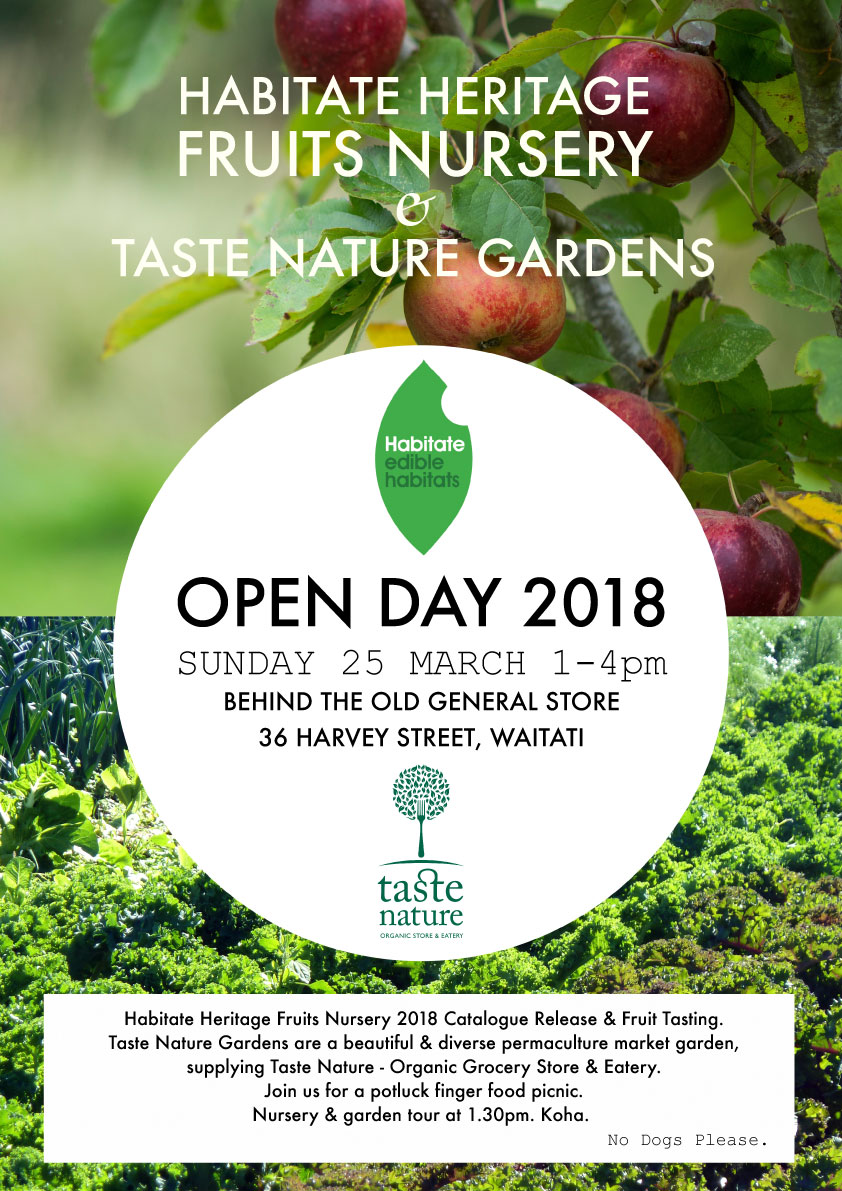
Saturday, March 12th, 2016
Bare rooted plants can be kept in their packaging for a few days. Keep them cool and moist by watering the root ball in the packaging, swishing the water around, and then tipping the water back out.
If there is to be a delay of more than a few days before planting, heel the plants in: Soak the roots for 15 minutes in water with a dash of liquid fertiliser. Place bundles into trenches of moist earth and loosely cover the roots with soil.
Animals: Fence from browsing animals otherwise you are buying very expensive animal feed! If Rabbits or Hares are present your trees will need trunk sleeves to 70cm. Fencing animals out? Perhaps you can design this infrastructure to also rotate beneficial animals within the orchard?
Shelter: The orchard site must be sheltered. On a windy site this shelter should be established at least a year ahead. If planting shelter the same year as the fruit trees use very fast species and consider planting not only the perimeter but also within the orchard with shelter trees.
Soil: A depth of around 15-20cm of topsoil is enough for most fruit trees. If drainage is an issue plant on a shallow mound or a swale berm. Balance soil minerals over the whole orchard area with mineral amendments.
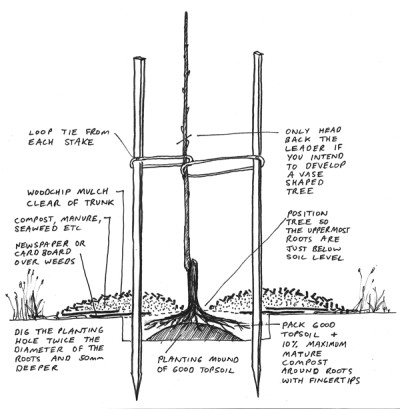 Planting Guide
Planting GuidePlant bare root trees and shrubs from Late June till late August.
Water weekly as needed for the first couple of months and then as needed in dry periods.
Surface feed and mulch each winter (under mulch) and watering in accordance with your soils needs and the plants growth. Establish appropriate groundcover plants to keep weeds, especially grass, suppressed.
Carefully chosen groundcover and companion plants such as Russian and Dwarf Comfrey, Sweet Cicely and Feverfew can help improve soil structure and fertility. They can also aid with pest and disease prevention.
Pinch off all flowers/ fruit in November until tree is growing vigorously and has strong branches, usually in their third summer you can leave a small crop on. Remove all growth from below the graft union.
Most fruit trees will naturally adopt a central leader shape, with a strong central trunk and near horizontal branches radiating off this. Stone fruit are usually trained as a vase shape (see below).
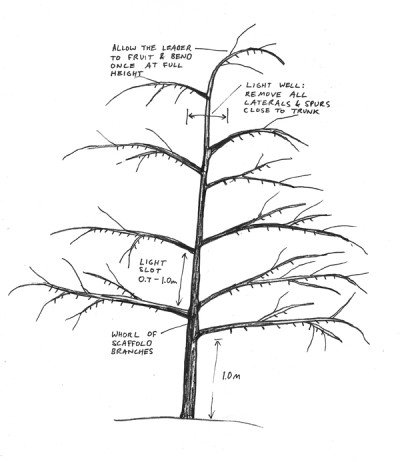 Central Leader
Central LeaderYear One: Leave the trunk un-pruned. Prune off any branches below 1m and any competing leaders. In November remove any developing fruit and train down all branches so that their junction with the trunk is near to ninety degrees and the branch is near to horizontal. Tree training rubber bands, twine or notched spacers can be used for this job.
Year Two: August, prune off any branches below 1m and any competing leaders. Prune out completely any dead, diseased or damaged (crossing) branches. Prune out any fruit spurs on or close to the trunk and any on the lower side of branches. Training aids from November may be removed now if the branches stay in the horizontal position. In November thin out all fruit except one or two near the trunk.
Year Three: Repeat winter pruning, take out whole branches as necessary to create well spaced branches up the trunk. You may leave more fruit on this year if the tree is sturdy. From now on thin all fruit to one or two fruit per spur.
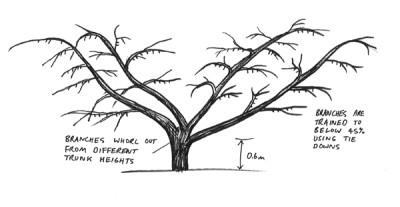 Vase Shape Trees
Vase Shape TreesYear One: Head back the main trunk to around 1m, either to some good side shoots or good buds. Prune off any branches below 0.8m and any competing leaders (side shoots growing too vertically). In November remove any developing fruit and train down all branches so that their junction with the trunk is near to ninety degrees and the branch is near to 45%. Tree training rubber bands, twine or notched spacers can be used for this job.
Year Two: August, select four strong branches to be your main vase structure. Prune off any branches below 0.8m and any vertical shoots surplus to your four main branches. Prune out completely any dead, diseased or damaged (crossing) branches. Prune out any fruit spurs on or close to the trunk and any on the lower side of branches. Training aids from November may be removed now if the branches stay in the 45% position. In November thin out all fruit except one or two near the trunk.
Year Three: Repeat winter pruning, take out whole branches as necessary to create well spaced vase of four branches from the main trunk. You may leave more fruit on this year if the tree is sturdy. From now on thin all fruit to one or two fruit per spur.
Monday, February 29th, 2016
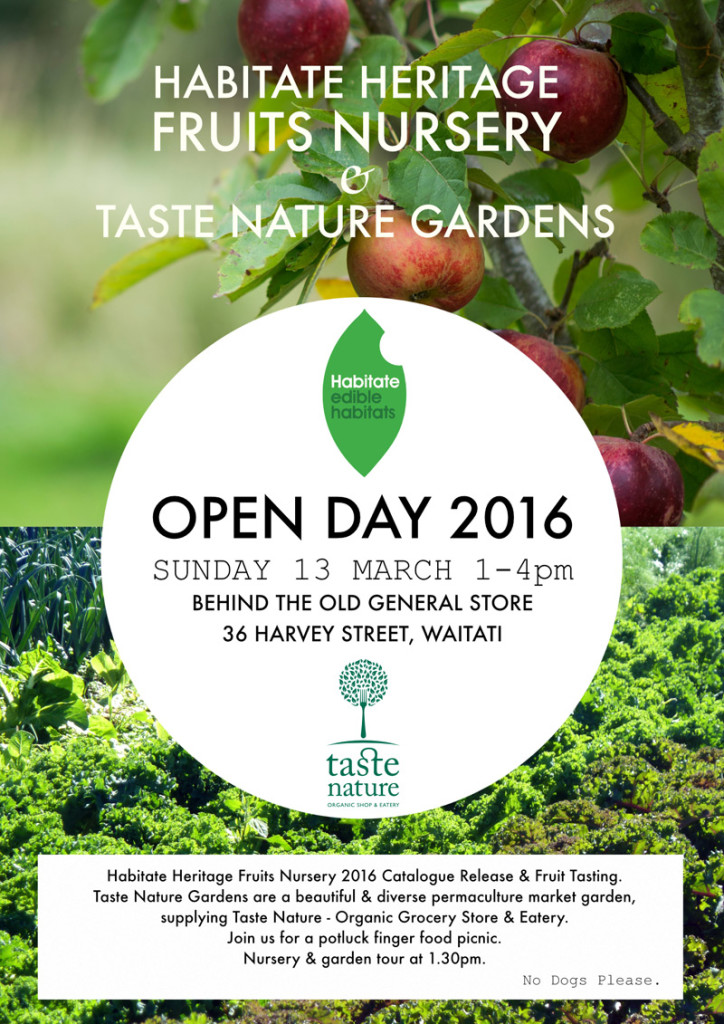 We warmly invite you to our annual nursery open day, this year its combined with Taste Nature Gardens (http://www.tastenature.co.nz/the-garden/).
We warmly invite you to our annual nursery open day, this year its combined with Taste Nature Gardens (http://www.tastenature.co.nz/the-garden/).
Bring a blanket and soak up the goodness of this diverse and beautiful productive permaculture property.
Dont miss the fruit tastings of heritatge fruits and our 2016 catalogue release.
Friday, May 22nd, 2015
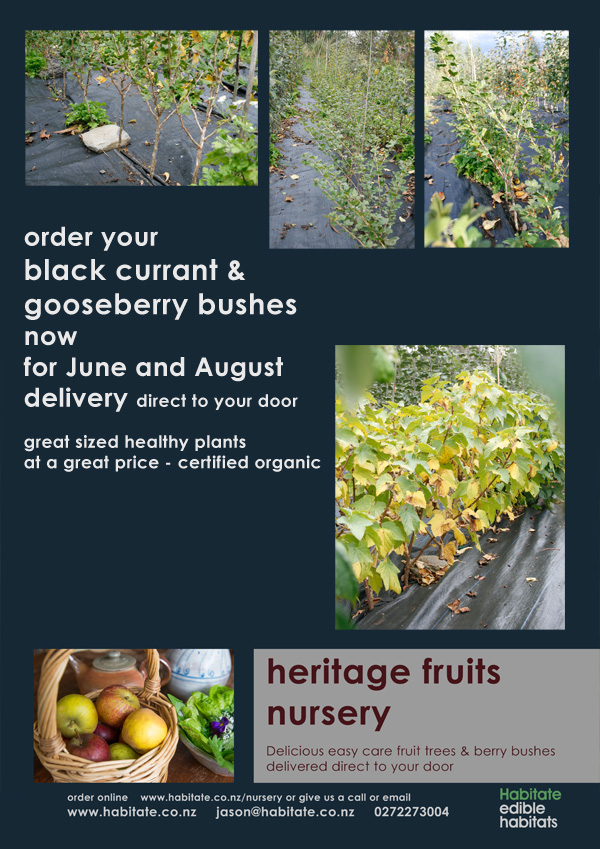
Order your black currant & gooseberry bushes online now, for june and August delivery.
Great sized healthy plants, at a great price – certified organic with Organic Farm New Zealand.
Tuesday, April 24th, 2012
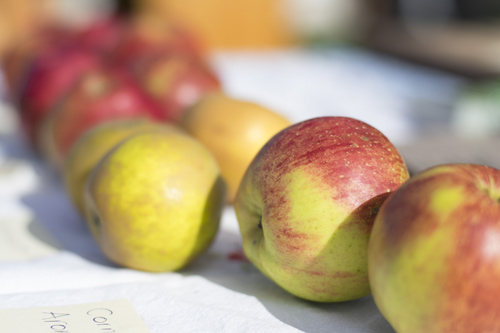
Science is slowly catching up with what we can taste and feel: “Older varieties of fruit and veg may be considerably healthier than their modern supermarket equivalents, researchers claim”.
One of our all time favourite apples, Egremont Russet is mentioned in the following article a friend just sent me:
http://www.nzherald.co.nz/
Pictured are apples on our display at the Waitati A&P Show.